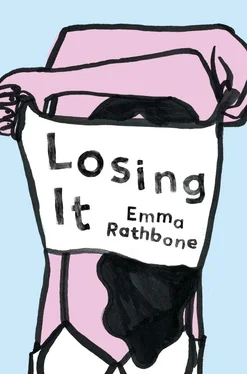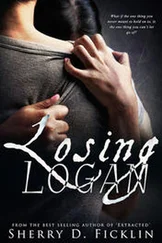He got up abruptly and when he came back with a condom something had changed in me. He could tell. It all fizzled. I gave him a hand job, my first one, and we both had the grim determination of trying to start a fire in plummeting temperatures. Anything to save the afternoon. He finally came, and we watched TV for another hour, and then I left.
I still wasn’t too worried about it, though, because I had Grace. We’d become friends quickly after meeting while waiting in line at the registrar’s office and had roomed together ever since. At the time she had shoulder-length, stick-straight brown hair that sliced along the tops of her shoulders, and a faint mustache, and she wore heavy charm bracelets. She was from Pennsylvania, and we had lots of grave conversations about our pasts. She told me about her golden brother with whom she’d had a rivalry and who may or may not have tried to murder their cousin. I told her my biggest secret at the time, which was that I was pretty sure our neighbor in San Antonio, old Mrs. Penman, was selling Oxycontin to the Mexican construction workers who waited at the bus stop on our street. We sat in our tiny room, feet up against the minifridge, or spread out on the hot benches in the rock garden outside the residence hall, or in the dusty bean bags in the un-renovated part of the library. It came out pretty soon that we were both virgins, and I clutched this shared fact. I pulled our friendship over me like a quilt, secure in the knowledge that I wasn’t the only one. I was more or less normal. Look at Grace. I mean, yes, she had a faint mustache and sometimes detached the charms from her bracelet and put them in her mouth while you were talking to her and her eyes would float around in a disembodied way, but still.
Then later that year, a guy came out of nowhere and introduced himself to her on the street. The way she told it, she was walking from the dining hall to the library, and he was on a bike and was suddenly in front of her. He had a stormy expression on his face, but later it turned out that he was just nervous. He had sharp cheekbones and a buzz cut. He’d been in her chemistry class but there were like a hundred students in the same lecture, so she hadn’t noticed him. He wanted to know if she’d like to go on a walk or have coffee sometime, and she did, and they started seeing each other.
It wasn’t long before one afternoon I noticed that she was looser in her movements. She laughed with an authority I’d never heard in her before, flung her head back with comfortable abandon. It was like she was welling in being herself. We’d be talking and I could tell her mind was elsewhere, thinking rich, faraway thoughts. She seemed more contained, and more spread out at the same time. An internal shift had taken place and I knew, crestfallen, what had happened.
She confessed it to me one afternoon in the library. The mixture of hesitation and guilt with which she told me only confirmed the direness of my situation. I remember how much I wanted what she had. We were the same two people. Our cells hadn’t changed. We were both sitting at the same circular table, at this point in time, in Arizona, like we always did, but now instead of being in it together it felt like we were two separate rotating plates in a rare moment of syncopation and would soon wheel away from each other. And that’s pretty much what happened. Sophomore year she moved in with her boyfriend.
It was then that I looked around and started to sense that something I’d previously thought was a given did not seem like such a sure thing anymore. It made talking to guys way more complicated. It was like when an appliance that’s been humming along stops working, and you take it apart and realize you don’t know how all the parts function or how it ever worked in the first place.
I discovered that I had a haughty way about me. It was something I’d picked up as a kid and never been able to shake — straight blond hair, broad, pointy shoulders, and an aloof manner that I was on some level aware of and yet completely unsure how to dismantle.
After college, I thought moving somewhere completely different would change things, would change me, that I would be shunted into a different humming world with new opportunities and friends and possibilities. I would get a knack for it, like I had with swimming. I’d find the right instincts. I pictured myself in an oval of sunlight on the street outside Arlington Cemetery, the smell of wet leaves, and a different grain to my life. Instead I found myself in a sterile, prefabricated housing complex with no friends. I hadn’t realized how much the infrastructure of swimming and college had made it easy to meet people. If I wanted to do so now, I had to crank my life in a way that didn’t feel natural — Internet dating or having difficult conversations at bars where you’re holding yourself still to talk to someone but the rest of you is floating around the room like a potion. Or, I went to a cooking class for singles once, and everyone there was astoundingly wrong: the stocky man with darting eyes who kept adjusting his belt buckle and mentioning his new duplex, the Canadian guy with womanly hips who disgorged his divorce story after two seconds of conversation.
And then I’d started to feel something I’d only glimpsed as a teenager, when it had been much easier to disregard — actual, corrosive, adult loneliness; a crystalline, desolate feeling of abandonment. Did other people feel this way? I hadn’t thought it would be like this when I was a kid.
It sat in me like a jumble of luggage I couldn’t put right, no matter how I rearranged it. Everyone else’s happiness seemed like a personal affront. I’d walk down the street, shivering in the shocking East Coast cold, and my insides would grind as I watched a couple leaning against the wall, pawing at a manila envelope together and laughing as they shook out its contents. What winds were pushing them and why weren’t they pushing me? How did they get lives with all the proper moving parts? I’d study a girl sitting across from her boyfriend at a lazy brunch restaurant, her face blooming, her hair mussed, perfectly nestled in her life, and it seemed impossible, totally out of the question, that that could ever be me. And there was no amount of practicing or trials or laps, no strengthening program to make it better. That helplessness added to my anger. This is a strain of it, I thought, that no one tells you about, this is a strain of being an adult. Desperation seeps into your bones as you lie alone in bed at night, wide-awake.
On my way home from some lackluster night out in D.C. with Jessica, passing lonely newsstands and fogged-up restaurants, and groups of friends jostling one another as they walked down the street, one question would blare in my mind: If things had been slightly different, if certain turns had been taken, could it just as easily have been another way?
Elliot Grouse leaned back in his chair. His hand was slung over a paperweight. His desk was covered in papers. There was a completely different atmosphere to his office today — strewn manila envelopes, crumpled pages on the floor. There were cups of old oversteeped tea on the shelves. It looked like he’d been working on something nonstop for days. I shifted my weight from one leg to the other. He was on the phone.
“It’s just a swipe card,” he said. “A swipe card. A swipe card . Mom? We’ll get it figured out, okay? I’ll call them tomorrow. I gotta go. I’m at work. I gotta go. Okay, Mom?”
I wondered when Elliot ever took the hair out of his ponytail, and if he only did it when he really wanted to relax. I wondered if it melted over his shoulders when he did, and if he would be shirtless, standing in front of the fridge in the middle of the night, or sitting on his bed, staring at his laptop, his hair draped over his back, and he’s cupping his chin in this way I’d seen him do, his eyes swimming with sleep.
Читать дальше
Конец ознакомительного отрывка
Купить книгу












